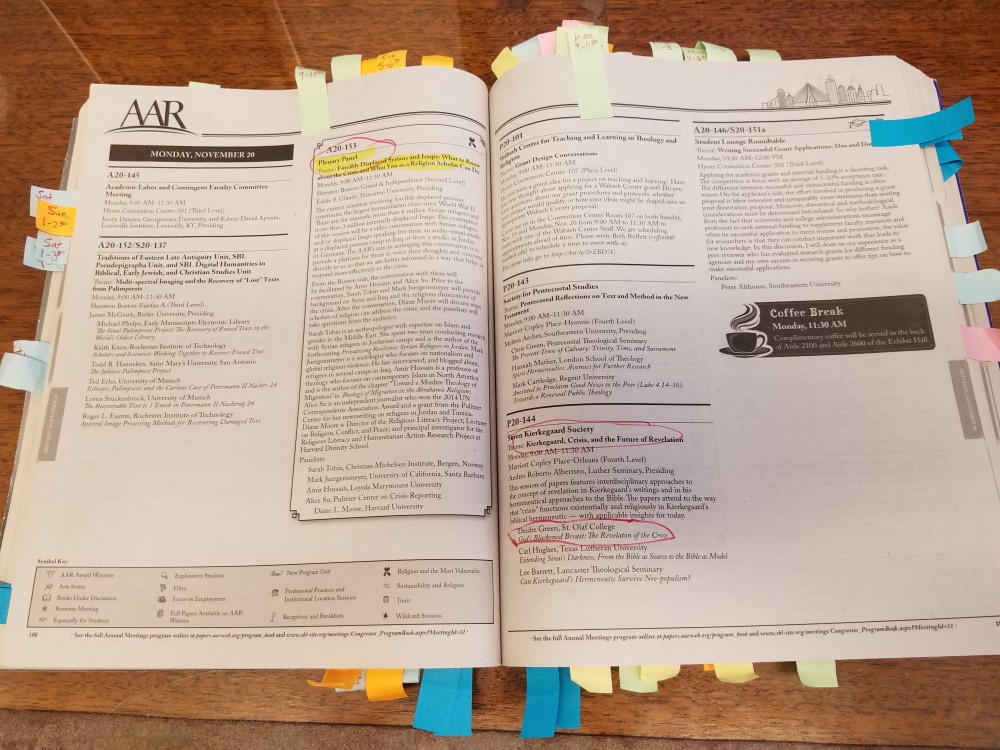Theophany on the train
How I found the gospel while reading about an academic conference

“What’s that you’re working on?” asked the woman sitting next to me on the train a few nights ago, after we’d bumped elbows and mumbled apologies to each other. I can understand why she was curious. Balanced in my lap was the program booklet for the American Academy of Religion and Society of Biblical Literature’s annual meetings. The pages were covered with red pen markings, yellow highlighting, and tab-sized sticky notes (color-coded by day).
I peeked at what my seatmate was reading before answering her question. She held an orange Gideon Bible, open to Colossians 2. “It’s a religion conference,” I answered. “I’m going to the conference in a few days and I have to decide which sessions I want to go to." She looked puzzled, so I added: "They’re academic talks about the Bible and religion and politics and faith.” I pointed to her Bible and smiled: “Here I am reading descriptions of talks about the Bible, and you’re reading the actual text.”
“I’m reading Colossians,” she replied. “It’s one of my favorite parts of the Bible. It tells us that everything is going to work out in the end. God is in control. That’s true, you know.”
I nodded and said with false enthusiasm, “I love Colossians!” It wasn’t exactly a lie, although I would’ve been hard pressed to name a single specific thing about Colossians in that moment as I juggled in my lap the program book, the red pen, the highlighter, and the sticky notes. I smiled politely and then returned to the laborious process of winnowing down 512 pages of talks into a 3-day schedule.
Narrowing down the options is never easy. Of course, there are some talks that I can eliminate immediately. These include Hexaplaric Recension or Ekdosis of Alexandrian Grammarian? and Autophagous Bliss: The Obliteration of Spatiality in the Bodily Philosophies of Georges Bataille and the Taittirīya Upanishad. I’m very glad that there are people in the world who devote themselves to such topics, but I am not one of those people.
The talks that most appeal to me fall into a few different categories. Some of the sessions have a theme that’s so intriguing that I want to attend them even if I don’t think they’re likely to be useful to my work at the Century. For example, I’d love to sit in on Hair in Greco-Roman Antiquity (which “relates the understanding and experience of hair in Greco-Roman antiquity to the meaning and significance of hair in the New Testament”) or The Hermeneutic of the Rainbow Snake. But there are probably better uses of my time.
Then there are the talks given by friends with whom I’ve failed to stay in touch as closely as I would have liked. I want to attend these presentations simply for that moment when the speaker sees me in the audience and feels loved (and perhaps forgives me for being a terrible long-distance friend). But these talks generally get bumped for topics that are more relevant to my work at the magazine. (Sorry, Sally and Jake: as much as I would love to listen to you talk about Review of Nordic Childhoods 1700-1960 and Promiscuous Vines: On the Queer Emergence of a Theological Botany, we might just have to meet for coffee instead.)
And then there are the celebrity talks, where the name of the presenter is enough to make me want to attend. Michelle Alexander. Candida Moss. Dale Evans. Willie Jennings. And that glorious session whose speakers include Melanie Harris, Barbara Rossing, and Elisabeth Schüssler Fiorenza. As much as I would love to sit in the presence of these brilliant people, their sessions usually get bumped for something that more directly intersects with my immediate interests.
In the end, I decided to attend the sessions that speak to my own deepest theological questions, joys, and difficulties. Reading Biblical Literature with the Heavyhearted and The Joban Theophany and the Education of God made it on to the final list. So did Blackness, Class, and Race and The Repentance of Playmobil Luther: Resisting Anti-Judaism in the Iconization of Luther in Popular Culture. Chickens, Partridges and the tor in Ancient Israel and the Hebrew Bible and On Technomasochism did not.
But I didn’t have time to make all these decisions on the train that evening. When we reached the final station, the Colossians-reading woman stood up, smiled, and said to me, “Remember, it’s all going to work out in the end.” I thanked her, and when I got home I opened my Bible to Colossians 2 to look at the verses she’d been reading. I found these words:
[In] Christ . . . are hidden all the treasures of wisdom and knowledge. I tell you this so that no one may deceive you by fine-sounding arguments. . . . See to it that no one takes you captive through hollow and deceptive philosophy, which depends on human tradition and the elemental spiritual forces of this world rather than on Christ.
I didn’t know whether to laugh or cry. All I could do was say to myself: “Remember, it’s all going to work out in the end.”





